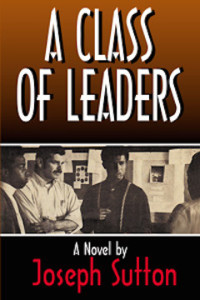It took 40 years but SF writer got it down, South Central LA 1960s
It may have taken him over 40 years to write, but author and Sunset District resident Joe Sutton is proud and excited about his latest novel, “A Class of Leaders.” It was released in March, (of 2010).
Set in 1969 at a high school in South Central Los Angeles, the names have been changed but the words of the students are taken from Sutton’s real life experience as a teacher.
“Actually, it took me three years to write “A Class of Leaders” but 40 years to perfect it with over a dozen revisions and lots of editing,” said Sutton. He invited the Sunset Beacon to join him at the Tennessee Grill on Taraval Street as he talked about his book and a bit about his life.
“I was not yet 30 back in 1969. I was single, young and idealistic. So much was happening in the world back then: drugs, sex and the Vietnam war. It was a very rebellious time,” said Sutton.
The novel is written in a diary style with excerpts of actual student comments taken from an “ideas/complaint” box that Joshua Sampson the teacher character in the novel has set in his classroom.
“Those comments are real,” said Sutton. “I really had an ideas/complaint box set near my desk for the students to drop in any type of note they wanted. And every note was read. I didn’t want my students to be afraid of me as a teacher,” said Sutton. “Each day the students would write down what they thought and felt about the subjects we discussed in class.”
Most of the comments concerned the powerful social and cultural changes that were taking place in the late 1960s as America was experiencing a tumultuous period, especially the war in Vietnam, which was dividing the country.
These perspectives are seen through the eyes of teens from South Central Los Angeles, a group made up mostly of African American students from working class families who were struggling to survive each day.
Discussions about racism, poverty, drugs, sex and the war in Vietnam were honestly expressed by the students in their own style of language reflective of those times. Some of their comments are blunt and by today’s standards, “politically incorrect.”
Sutton noted that some things in society are simply part of the human condition, “Styles may change, but we still have war, political unrest, injustice and inequality,” he said.
“I would love to see how my former students are doing,” said Sutton. “They would be in their mid-50s today.” At that time, Sutton admitted that his teaching style was unconventional. “I was not a great disciplinarian, and I still think having to police students or baby sit them is not the way to reach them,” Sutton said.
Sutton continued teaching until he retired in 1984. After leaving LA he eventually settled in San Francisco, teaching at several public high schools in the City. He now devotes all his time to writing.
When asked why it has taken decades for his novel to get published, Sutton said, “I wanted it to be all quality, from cover to cover, design, paper quality, everything. And, no mistakes,” he added.
He gives much credit and praise in the effort to his editor Don Ellis who also has helped him with his other published works such as “Morning Pages,” published in 2000.
“Don has worked on four of the five books I‘ve published so far,” said Sutton. Sutton, with the help of his editor, has “three more books in the pipeline. One is a nonfiction book about writing and two are novels.”
“A Class of Leaders,” a novel by Joseph Sutton published by Mad Dog Publishing of Berkeley, can be purchased via the web. Visit his web site for details.
(JF note: This article first appeared in The Sunset Beacon newspaper of San Francisco in the spring of 2010)

Leave a Reply